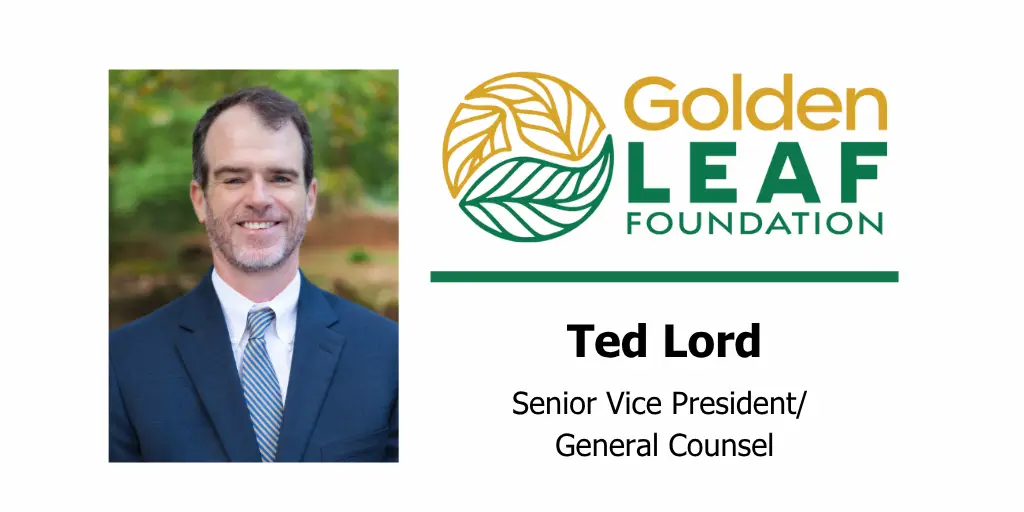Recently, Golden LEAF President, Chief Executive Officer Scott T. Hamilton sat down with Ted Lord, Golden LEAF Senior Vice President/General Counsel, via Zoom and filmed an episode of Critical Conversations. In this series, Scott talks with professionals about economic development issues affecting the state.
Lord joined the Golden LEAF Foundation in 2005 as a program officer and now serves the Foundation as senior vice president and general counsel. A native of Winston-Salem, Lord was a fellow at the Z. Smith Reynolds Foundation following college. After law school, Lord clerked for a federal judge and then practiced law in Greensboro. He then learned of an opening at the Golden LEAF Foundation and joined the team as a program officer. Over the years, he used his legal knowledge to support the work of the Foundation alongside outside counsel.
Over 20 years, Lord said he has seen changes at Golden LEAF. He shared that Golden LEAF has grown significantly from a small staff of four working on program work to now a staff of nearly 30 employees. He explained that the Foundation assets have increased significantly, and the Board in recent years has engaged in more strategic, foundation-driven initiatives.
Lord oversees the applications that come into Golden LEAF. He suggested that potential applicants review GoldenLEAF.org for information about the priority outcomes and eligibility for each of the funding programs. He added that alignment of a project to the funding program and priorities is key to making a strong case for funding. Lord said that applicants are welcome to reach out to Golden LEAF staff to talk about projects. The best way to do that is to fill out the inquiry form located on the website.
Golden LEAF programs and projects have made a large impact on communities over 25 years. Lord added that one of the biggest impacts he has seen comes from Golden LEAF’s longest standing program, the Golden LEAF Scholarship Program. He shared that 215 four-year scholarships are awarded each year to students from rural communities who plan to attend North Carolina colleges and return to their hometowns after graduation. These students are also eligible for paid internships in rural communities. Additionally, Golden LEAF supports scholarships at community colleges to help with rural workforce development.
In terms of a large-scale project that stands out to Lord is the early support for the Greensboro-Randolph Megasite. Through the Major Site Development Initiative, Golden LEAF provided funding to extend sewer infrastructure to the site and supported road improvements, helping to land the Toyota battery manufacturing facility. Lord said that the project is going to have a multi-county impact for years to come. He also shared smaller, community-driven projects like in the Town of Aurora continue to make a difference to that community. Golden LEAF funded water and sewer infrastructure for an industrial park and supported a nearby workforce training facility in partnership with the community college. This is an example of a small town coming together to invest in a shared future. Residents, leadership, local industry, and the state made this project a reality, added Lord.
Golden LEAF has had several new initiatives and programs over the past several years, said Lord. The SITE Program, launched after Golden LEAF’s strategic planning effort, helps rural communities prepare industrial sites to attract manufacturing jobs. Golden LEAF is actively involved in the NC Ag Leads initiative, which was funded by Golden LEAF, and now has a strategic plan in place. NC Ag Leads is now working to turn the plan into actionable projects. The recently announced $25 million partnership with the NC Department of Public Instruction will support low-performing middle schools in rural communities. The five-year, Golden LEAF Schools initiative includes intensive support for students, teachers, and school leadership. The Foundation also recently started exploring ways to support workforce housing by funding the infrastructure needed to build more housing in rural areas. Finally, Golden LEAF is working on a strategic framework that allows more flexibility, so ideas that fall outside of the traditional programs, but still align with the mission, can be considered for funding.
Lord shared that what has kept him at Golden LEAF for two decades is a deep connection to this state, an appreciation for the unique role small communities play across North Carolina, and the desire to help small, rural communities adapt, maintain their identities, and thrive despite economic transitions. He explained that Golden LEAF is all about supporting rural North Carolina’s economic development and resilience. He said he is excited about how Golden LEAF has grown over his 20 years in its ability to be strategic. He added that the Golden LEAF Board is committed to identifying new initiatives that make a real difference for the state. He looks forward to continuing that work, partnering with communities, learning from their experiences, and helping to implement meaningful, scalable solutions for rural North Carolina.

